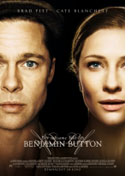

Opening 29 Jan 2009
Directed by:
David Fincher
Writing credits:
Eric Roth, Robin Swicord
Principal actors:
Cate Blanchett, Julia Ormond, Brad Pitt, Tilda Swinton, Taraji P. Henson
Benjamin is born, his mother dies in childbirth and his father immediately dumps his disfigured son on a random doorstep , not knowing that the infant’s ghastly appearance is because he was born as an eighty-year-old man. Cataracts, bone mass loss and sagging skin, the curious case of Benjamin is confirmed by the house doctor, but isn’t pondered on by his adoptive mother Queenie (Taraji P. Henson), a care worker for elderly residents of a New Orleans retirement home. So begins Benjamin’s life, running parallel to a clock that runs backwards in the city train station: marking time in reverse. Jump to Benjamin (now the face of Brad Pitt superimposed on a rickety body) in a wheelchair at age seven. Like the other geriatric residents, he shares their physical maladies but has the spark of a normal young boy, fidgeting at the table and learning to read from food cans in the kitchen. As he meets the grandchildren who visit the home, he encounters red-haired Daisy, who becomes the great love of his peculiar life. Eventually, between Daisy’s (Cate Blanchett) normal life span and Benjamin‘s backwards journey, they find a space in time where they mesh at just the right age, only to discover the old adage that “nothing lasts.”
Curiosity might bring many a movie-goer into the theaters to marvel at the technical finesse required to portray Brad Pitt at practically every stage of Benjamin’s life. He grows in the natural way from gnarled infant to adult man, but then slowly grows shorter in his “teens,” eventually reducing back into a baby at his death. While his proper year age is reflected in his personality, mentally-aging disorders such as dementia do not bloom until he is quite old chronologically, even though he experiences physical maladies in reverse. Hmm, it all sounds quite confusing, but the wonder of this film is that it all makes sense on the big screen. That being said, the story has many weak points, most pointedly that it resembles the saga Forrest Gump on many counts: New Orleans home locale that expands to worldly settings, flawed fishing boat captain/mentor, drawling accents, disturbed women that hover in and out of our lead’s life, taking strength from his acceptance of his own life situation. It is no surprise that the script, which was adapted from an F. Scott Fitzgerald story, was written by Eric Roth, the same scribe of afore-noted Forrest Gump screenplay. If you are looking for something new in Benjamin Button, don’t be disappointed when you get a bit of déjà vu. Besides Oscar-nominated Pitt and Henson, there are great performances from Blanchett and Tilda Swinton, who has yet to take on a role that she doesn’t breathe the essence of absolute perfection into. After 165 minutes, don’t be upset if the end message comes up short; The Curious Case of Benjamin Button engages you by allowing the players to flex their acting muscles and present you with a rolling story of time and flow, supplemented with a make-up staff that deserves a multitude of accolades. (Kirstan Böttger)